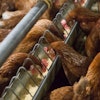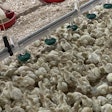The Chinese Ministry of Commerce (MOFCOM) will retain restrictive antidumping and countervailing duties on imports of U.S. chicken. The agency announced July 8 that it would reduce the duties on some U.S. poultry companies, while raising them on others.
The move from the Chinese ministry follows the World Trade Organization’s (WTO) ruling made in September 2014 that followed a longtime dispute between the two countries. China in 2010 had accused the U.S. of dumping and imposed tariffs on imports of U.S. chicken products, but the WTO ruled in favor of the U.S. chicken industry.
Antidumping and countervailing duties adjusted, but not lifted
After the WTO made its ruling, China had agreed not to appeal. The U.S. poultry industry had hoped the duties would be lifted, but MOFCOM’s recent actions concerning the duties showed otherwise.
According to the USA Poultry & Egg Export Council (USAPEEC), MOFCOM lowered the anti-dumping duty slightly on two of the three companies named in its initial anti-dumping and countervailing duty investigation, initiated in 2009, while raising the duty on the third company, along with those companies that cooperated in the investigation. According to USAPEEC, the Chinese agency lowered the duty rate on companies that did not cooperate. The countervailing duty rates follow a similar pattern.
USAPEEC, National Chicken Council seeks resolution on duties
USAPEEC and the National Chicken Council have both stated China’s decision to adjust the duties lack clarity, and are working with government officials in hopes of resolving the matter.
“We are disappointed to say the least,” said USAPEEC President Jim Sumner, whose organization has been fighting China’s allegation, along with many of the private companies involved. “We are consulting with the Office of the U.S. Trade Representative on the matter to determine our industry’s options, and to ensure that China complies with the WTO’s original ruling, which this clearly does not.”
“The World Trade Organization ruled on the facts and merits of this case and found that China’s actions were unjustified, and now continue to be unjustified, under international trade rules,” said NCC President Mike Brown. “We will begin working immediately with the U.S. government to seek a legal resolution to these actions by the Chinese.”


















